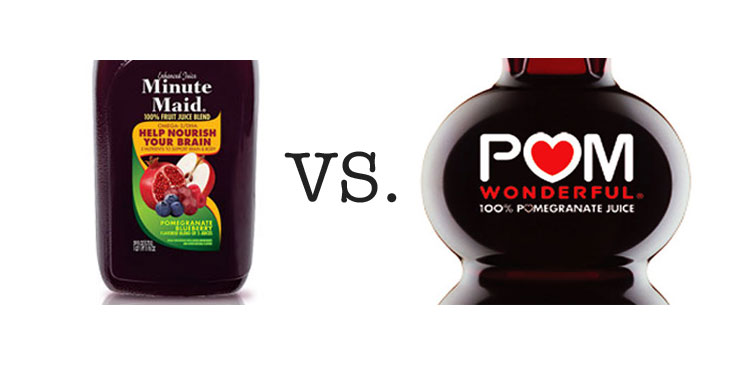
Best Reader Tips of 2021
This year reader tips led to dozens of ad alerts, as well as a complaint to regulators.
Supreme Court rules on POM juice labeling issue.
|
In the dueling battle over what a company can label pomegranate juice (or any juice for that matter) and which federal regulations apply, chalk one up for competitors suing competitors. The Supreme Court ruled today that FDA labeling regulations do not preclude a company from bringing a claim under the Federal law that allows companies to sue other companies for false advertising (i.e., if they misrepresent the nature or qualities of their good or service in commercial advertising). against a competitor they feel is falsely advertising a product.
The court said there is nothing in the Federal Food, Drug and Cosmetic Act (FDCA) that forbids or limits challenges under the Lanham Act. The FDCA forbids the misbranding of food, including by means of false or misleading labeling. The Lanham Act permits competitors to sue one another for unfair competition arising from false or misleading product descriptions. The court said that precluding Lanham Act challenges could hurt consumers:
Because the FDA does not necessarily pursue enforcement measures regarding all objectionable labels, preclusion of Lanham Act claims could leave commercial interests—and indirectly the public at large – with less effective protection in the food and beverage labeling realm than in other less regulated industries.
The case stemmed from POM Wonderful’s claim that it has a right to sue competitor Coca-Cola over its Minute Maid pomegranate and blueberry fruit juice that has less than one percent pomegranate juice in it. The juice is predominately apple and grape juices. POM, which markets its own pomegranate juice, sued Coca-Cola claiming its juice label tricks consumers into believing the beverage consists predominately of pomegranate and blueberry juice and causes POM to lose sales. Coke maintained that its labeling of the juice blends is consistent with FDA regulations and the FDA regulations are the ultimate authority on the issue.
Not so fast, said the Supreme Court. The FDCA is not king. The two regulations, the justices said, complement each other:
Allowing Lanham Act suits takes advantage of synergies among multiple methods of regulation… Competitors who manufacture or distribute products have detailed knowledge regarding how consumers rely upon certain sales and marketing strategies. Their awareness of unfair competition practices may be far more immediate and accurate than that of agency rulemakers and regulators.
So, POM can sue and so can a whole bunch of companies taking exception to competitors’ labels. Competitors holding each other’s feet to the fire over deceptive labeling can only be a help to consumers. Meanwhile though, the ruling means POM will be spending much more time in court, not just as it pursues its case against Coke but in defending itself from FTC charges regarding claims that its pomegranate juice can prevent or treat all sorts of ailments.
In January 2015, POM lost its battle against the FTC when a panel of the U.S. Court of Appeals upheld the agency’s false advertising claims against the company. In April, POM filed a court brief requesting the entire D.C. Circuit Court of Appeals review the case, arguing that important First Amendment issues were at stake but the court denied the petition. POM took it to the Supreme Court.
UPDATE: POM lost its false advertising lawsuit against Coke when a California jury ruled that the juices’ labels weren’t misleading. The Supreme Court also declined to review the D.C. Circuit’s ruling upholding the FTC’s findings that the company misled consumers in advertising their products.
This story was most recently updated on 5/2/16.
This year reader tips led to dozens of ad alerts, as well as a complaint to regulators.
It’s the perfect formula for a class-action lawsuit trend.
These marketing claims are feeling the heat.


